|
|
|
Sort Order |
|
|
|
Items / Page
|
|
|
|
|
|
|
| Srl | Item |
| 1 |
ID:
096219
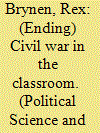

|
|
|
|
|
| Publication |
2010.
|
| Summary/Abstract |
There often exists a problematic gap between more theoretical works on war-to-peace transitions, and the practical challenges that peacebuilding operations face in the field. This article describes the use of classroom simulation to highlight the complexity of contemporary multilateral peace operations. It describes the content and mechanics of the simulation, the issues that can arise in its operation, and strategies for most effectively integrating such a simulation into overall course objectives.
|
|
|
|
|
|
|
|
|
|
|
|
|
|
|
|
| 2 |
ID:
112716
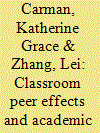

|
|
|
|
|
| Publication |
2012.
|
| Summary/Abstract |
This paper estimates peer effects on student achievement using a panel data set from a middle school in China. Unique features of the organization of Chinese middle schools (Grades 7 to 9) and panel data allow us to overcome difficulties that have hindered the separation of peer effects from omitted individual factors due to self-selection and from common teacher effects and to identify peer effects at the classroom level. We estimate peer effects for Math, English, and Chinese test scores separately. In a linear-in-means model controlling for both individual and teacher-by-test fixed effects, peers are found to have a positive and significant effect on math test scores, a positive but insignificant effect on Chinese test scores, but no effect on English test scores. Importantly, in Math and Chinese students at the middle of the ability distribution tend to benefit from better peers, whereas students at the ends of the ability distribution do not, suggesting that policy makers who want to exploit positive peer effects face difficult tradeoffs in classroom and school assignment.
|
|
|
|
|
|
|
|
|
|
|
|
|
|
|
|
| 3 |
ID:
186830
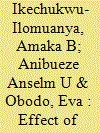

|
|
|
|
|
| Summary/Abstract |
Limited literature exists on how to improve classroom concentration (CC) of survivors of kidnapping. The current study extends the literature in this direction through a quasi-experiment involving 470 schoolchildren (SC) who survived kidnapping in the last one year. The result of the study showed that SC who received counseling through a visual multimedia (VM) package reported more CC than their counterparts who received counseling through face-to-face setting. The study concludes that VM is a cost-effective way of improving CC of SC who are survivors of kidnapping.
|
|
|
|
|
|
|
|
|
|
|
|
|
|
|
|
| 4 |
ID:
098204
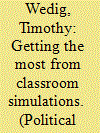

|
|
|
|
|
| Publication |
2010.
|
| Summary/Abstract |
Classroom simulations can make a significant contribution to learning outcomes in political science courses, provided that they are firmly linked to course content and learning objectives. This article offers a step-by-step decision framework for instructors seeking to use simulations as a core component of their courses, including selection of an exercise, pre-simulation preparation, instructor role during a simulation, and techniques for debriefing after the exercise. Options such as online and face-to-face, synchronous and asynchronous, distributed and single classroom, and individual and team formats are compared, with a focus on their associated learning outcomes.
|
|
|
|
|
|
|
|
|
|
|
|
|
|
|
|
| 5 |
ID:
121637
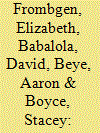

|
|
|
|
|
| Publication |
2013.
|
| Summary/Abstract |
How can we make international relations real and meaningful for undergraduates? Because of my own frustration with this challenge, I tried a new way of teaching international relations. During the fall 2009 semester, the final exam for an upper-division course required the students to create and conduct a simulation to teach other students about international political institutions. I willingly gave up control of my classroom to the students!
|
|
|
|
|
|
|
|
|
|
|
|
|
|
|
|
| 6 |
ID:
168944
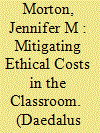

|
|
|
|
|
| Summary/Abstract |
Students from disadvantaged backgrounds often find that succeeding on the path of upward mobility through education requires that they distance themselves from their communities, family, and friends. This distancing often involves the weakening or loss of aspects of their lives that are meaningful and important to them: their relationships with family and friends, their connection to their communities, and their sense of identity. These goods, by their nature, are not ones that are easily replaced. Yet their loss can be mitigated by the development of new relationships and new communities. In this essay, I argue that colleges and universities have an obligation to facilitate the mitigation of these costs for students from disadvantaged backgrounds. Doing so, however, is not as simple as it might seem. These students often feel alienated from campus life outside of the classroom and many do not even attend residential colleges. These two factors suggest that universities and professors will need to take more seriously the classroom as a central site for giving students from disadvantaged backgrounds opportunities to enter into new relationships and find new communities.
|
|
|
|
|
|
|
|
|
|
|
|
|
|
|
|
| 7 |
ID:
098206
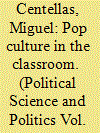

|
|
|
|
|
| Publication |
2010.
|
| Summary/Abstract |
This article discusses the use of pop culture in the classroom as a means to teach foundational political science authors and concepts. I focus on my experience using American Idol as a point of reference to discuss Marx and Engel's The Communist Manifesto and Tocqueville's Democracy in America in undergraduate comparative politics courses. Students are asked to construct a written argument projecting Marx or Tocqueville's perceptions of American Idol, based on their readings. My experiences demonstrate that asking students to reflect on their own contemporary experience through the prism of these two works helps them in three ways: (1) to better understand the ideas of Marx and Tocqueville, as well as their differences; (2) to develop an appreciation for the continued relevance of works in the discipline's canon; and (3) to sharpen and develop critical thinking and analytical skills.
|
|
|
|
|
|
|
|
|
|
|
|
|
|
|
|
| 8 |
ID:
092567
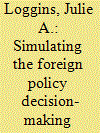

|
|
|
|
|
| Publication |
2009.
|
| Summary/Abstract |
A simulation of the foreign policy decision-making process, as described in this article, can assist an instructor in linking students' abstract understanding of complex political events, circumstances, and decision making to the real-world interplay of the multiple factors involved in decision making. It is this type of active learning that helps bring a student's abstract understanding into the concrete world. Instead of being passive learners relying on an instructor's knowledge, students are active participants in the learning process.
|
|
|
|
|
|
|
|
|
|
|
|
|
|
|
|
| 9 |
ID:
156205
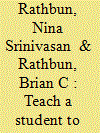

|
|
|
|
|
| Summary/Abstract |
American higher-education institutions are under increasing pressure to prepare their students with practical skills for the workplace, and the social sciences—including political science—are not immune. Political figures have suggested—sometimes seconded by academics themselves—that research distracts academics from imparting practical skills to undergraduate students. Using a survey of international relations (IR) scholars, this article shows that this is not the case. Those who spend more time on research actually devote more time to policy-relevant research in their courses than more abstract and theoretical work, and they incorporate more contemporary issues. Research seems to encourage academics to teach their students to fish.
|
|
|
|
|
|
|
|
|
|
|
|
|
|
|
|
|
|
|
|
|